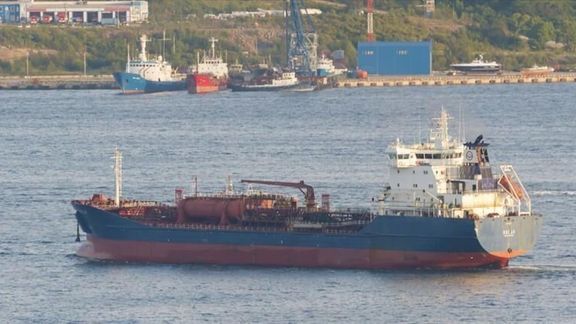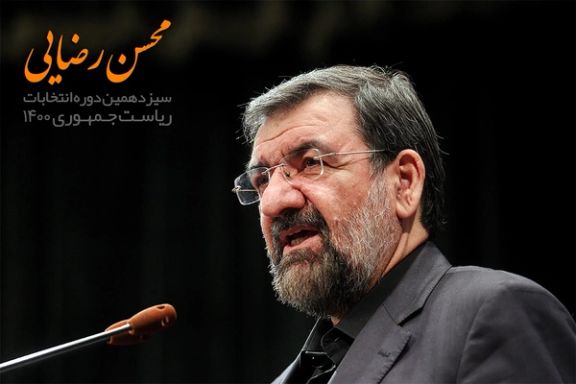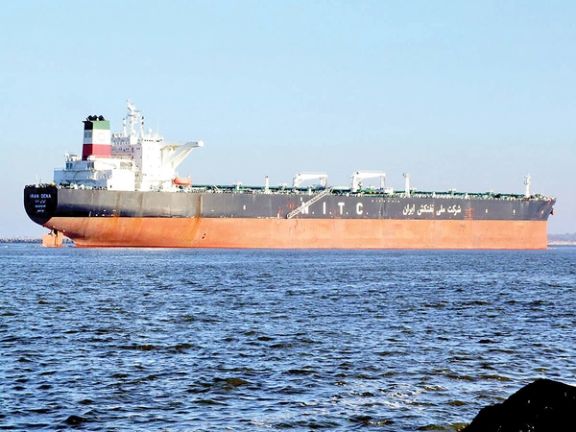Iran Summons Greek Envoy Over Seizure Of Crude Cargo

Iran’s Foreign Ministry summoned Wednesday the Greek chargé d'affaires to protest the seizure of a vessel carrying Iranian crude oil in Greece's territorial waters.

Iran’s Foreign Ministry summoned Wednesday the Greek chargé d'affaires to protest the seizure of a vessel carrying Iranian crude oil in Greece's territorial waters.
The ministry said it notified the Greek envoy of his country's "international obligations" regarding the vessel's emergency stop due to a technical difficulty.
The Russia-flagged aframax Lana, formerly named Pegas, was detained on April 15 by Greek authorities and had been waiting at Karistos port pending a court ruling. On Monday afternoon, a tanker owned by Dynacom Tankers Management, called Ice Energy, was chartered by the US Department of Justice and started a ship-to-ship transfer of the US-sanctioned Iranian crude on the basis of Russian sanctions.
The operation, first reported by watchdog group United Against Iran, was verified using Lloyd's List intelligence data.
The head of the Mediterranean and East European affairs at the Iranian ministry condemned Greece’s "unacceptable" surrender to "illegal" US sanctions, saying the "seizure of the cargo of the ship with the flag of the Islamic Republic of Iran was an example of international piracy."
Lana, which arrived off Greece early in April with reports of a possible mechanical failure and anchored south of the Greek island of Evia, was identified as the Russian-flagged Pegas and the assumption at the time was that it was laden with Russian crude.
"The seizure came at the request of the Americans because the cargo came from a sanctioned country and moved on a sanctioned ship," a Greek official told Dow Jones on Wednesday.

Tehran and Moscow have signed a number of major memoranda of understanding (MoUs) to expand energy and trade ties, as Russian Deputy Prime Minister Alexander Novak visited Iran.
The agreements were signed in Tehran on Wednesday during a meeting attended by Novak and Iranian Oil Minister Javad Owji.
"Iran and Russia are both under oppressive sanctions, which, God willing, can be neutralized by working together and developing relations in various fields," Owji was quoted as saying by the oil ministry’s news agency, Shana.
"Good agreements were reached in the fields of rail, road transport, shipping and aviation," he said, without expanding further, adding that both sides have "good capacities for cooperation in energy, banking, transportation, agriculture, nuclear energy, industry and trade".
"We plan to increase the level of Iran-Russia trade relations in these fields to $40 billion a year," the oil minister added. Current annual bilateral trade is around $4 billion.
According to Russia's Interfax news agency Novak and Owji discussed the potential for oil and gas swaps, as well as "increasing joint investments in oil and gas projects" with the Russian official emphasizing that "Energy is one of the most important sectors of our trade and economic cooperation."
"We agreed to switch over to the use of national currencies as much as possible," Novak added, noting that "A path is being pursued to increasing trade, economic, logistics, investment, financial and banking cooperation, despite the unprecedented pressure that Russia is currently experiencing from unfriendly countries."
While Tehran has been chafing under sanctions for years, especially after the US pulled out of the nuclear deal in 2018, Western governments have imposed tough sanctions on Russia after it invaded Ukraine in February.

All schools, universities, and businesses in Tehran and other cities of the province were closed Wednesday, some for the second day, due to air pollution.
Tehran Governor Mohsen Mansouri announced the measure following a decision by the Tehran Province Air Pollution Emergency Committee. The neighboring province of Alborz, the southern province of Khuzestan, East Azarbaijan province in the north west, and Esfahan province in central Iran also reported shut-downs due to air pollution including severe sandstorms.
The air quality index in many Iranian cities, including Tehran and Kermanshah, has reached a maximum level, making it hazardous for people to leave their homes. While Tehran’s air is among the world’s most polluted, many large Iranian cities face similar problems, especially when power stations use heavy diesel fuels as demand for electricity runs ahead of the supply of natural gas.
Dust storms, originating in both Iran and neighboring countries, have also increased markedly in recent years in several Iranian provinces, notably Khuzestan, Kermanshah, and Sistan-Baluchestan. While there have been efforts to reduce such storms through more effective management of water resources and planting drought-resistant trees in arid areas, these have so far proved inadequate.

Vice President for Economic Affairs Mohsen Rezaei says Iran is facing yet another difficult year, as recent price hikes led to several days of protests.
During a visit to Khuzestan Province on Monday, he also said that Iran has been experiencing a 40 percent inflation rate for several years now.
Rezaei argued that the people should be convinced the government has an economic plan and is trying to solve their problems. His remarks contradicted many Iranian analysts and politicians including several lawmakers who have charged that the Raisi administration does not have an economic plan and it is his economic team's ad-hoc decisions that have led to an economic crisis.
Rezaei told Friday prayers imams of Khuzestan that the government is trying to gradually reform the economy and that President Ebrahim Raisi has asked several think tanks to write a document about “this evolution.” He further claimed that in the past 26 years Supreme Leader Ali Khamenei has repeatedly called on successive governments to start economic reforms, but nothing has been done.
Rezaei, a military man with no experience in running the economy, made uncalculated comments a few months ago, which led to an unofficial ban on him to declare economic policies. His comments on Monday coincided with president Raisi being absent, on a visit to Oman.

The vice president was last seen Tuesday morning sitting on the floor of a building in Abadan with Interior minister Ahmad Vahidiand a group of local officials, reportedly leading a meeting about relief work following the collapse of a high rise building which killed 16 people, and tens of others injured or gone missing.
Saeed Hafezi, a local reporter, told the Iran International TV Tuesday afternoon that the owner of the collapsed Building Hossein Abdolbaghi was linked to Mohsen Rezaei, adding that while Abdolbaghi was reportedly arrested, it was said after Rezaei's arrival in Abadan that he was killed under the debris.
Meanwhile, commenting on Rezaei's remarks on the Iranian economy during the year, Reza Gheidi, an economic journalist in Tehran told Iran International TV that Iranians no longer believe or trust remarks or promises by state officials, mainly because they constantly contradict themselves.
Gheidi added that the situation is marked by the people's disillusionment and disappointment about state officials' ability to deal with the economic crisis. Iranians are currently thinking of food not as something that can keep them healthy, but as something that can simply fill their stomach, as prices have doubled and tripled in recent weeks.
Meanwhile, Ahmad Alirezabeigi, a lawmaker for Tabriz has harshly criticized state officials "for insulting Iranians' intelligence when talking about the economy and the causes of protests from 2018 to 2022."
The lawmaker said that the people are feeling the pressure of rising prices with their flesh and bones as the impact of the government's policy of removing food subsidies has given rise to further inflation. He characterized state officials’ promises about no further price rises as "nonsense."
While the government insists that it has hiked the price of a few food items, another lawmaker, Hassan Lotfi, said on 21 May that price rises have already impacted a range of some 700 household items.

After a year of talks over reviving the 2015 Iran nuclear deal, today’s appearance by special envoy Rob Malley at the United States senate may prove decisive.
Malley is sure to be questioned, by supporters and opponents of the 2015 deal (the JCPOA, Joint Comprehensive Plan of Action), over Israeli prime minister Naftali Bennett’s claim Tuesday that President Joe Biden has decided not to accept Iran’s demand that he drop the Revolutionary Guards (IRGC) from the US list of ‘foreign terrorist organizations.’
Supporters of the JCPOA in the US argue that the listing, by President Donald Trump in 2019, was one of many measures intended to doom subsequent efforts to renew the deal, from which Trump withdrew the US in 2018. They also say the the killing of Iranian IRGC colonel Hassan Sayyad-Khodayari was an attempt to inflame Iran’s leadership and undermine diplomacy.
Critics of the JCPOA say the IRGC listing reflects its regional role and alliances with Hezbollah, Ansar Allah in Yemen, armed Iraqi groups, and Syrian President Bashar al-Assad. They take comfort from statements from State Department spokesman Ned Price that the issue of IRGC listing is separate from the nuclear negotiations and requires further assurances or concessions from Tehran.
Decision on IRGC listing
Bennett said Tuesday that Biden had informed him April 24 that he had decided not to remove the IRGC listing. Bennett sadi he had agreed not to reveal this but had done so once an article appeared in Politico.
While the Israeli leadership’s opposition to the JCPOA led to tensions with the incoming Biden administration, given the latter’s commitment to reviving the agreement, Bennett now described his recent contacts with Biden as close.
“I laud the US administration, and first and foremost my friend, President Joe Biden, on his intention to leave the Revolutionary Guards where they belong – on the terror list,” Bennett said Tuesday. “President Biden is a true friend of Israel who is concerned with its security and continued fortitude.”
With feelings in Tehran running high after the Sayyad-Khodayari assassination Sunday, and continued pressure for some retaliation for the US 2020 killing of IRGC commander Qasem Soleimani in Baghdad, the Iranian leadership has appeared wary of compromise and has insisted that the delisting of the Guards is a ‘red line’ in the nuclear talks.
A recent visit to Tehran by Enrique Mora, the senior European Union official chairing the year-long nuclear talks in Vienna between Iran and six world powers, raised hopes of a breakthrough but appears to have produced nothing tangible. Likewise, nothing evident has emerged from Qatari attempts at mediation.
Washington awaits
In Washington, senators eagerly await Malley’s appearance at the Senate Foreign Relations Committee with a variety of hopes and expectations.
“I want Rob Malley to give an honest assessment of the status of negotiations and make the case for why diplomacy is the only viable path to keep Iran from a nuclear weapon,” Connecticut’s Democrat Senator Chris Murphy told Iran International Tuesday. “I don't think the US or our allies should be involved in the business of assassination…ratcheting up political assassination frankly puts all of us at risk, and isn't a good practice for democratic nations.”
But Rick Scott, a Republican representing Florida, said the talks were at a dead end. “What I would hope to hear [from Malley] is that they're not going to do anything, because the Iranians still chant death to Israel…They still have death threats on American citizens.”
Reflecting a sense in Washington that Malley needed to clarify and explain the strategy of the Biden administration,Alabama Republican Tommy Tuberville opposed renewing the JCPOA but ruled out military means. “There's no way we can allow Iran to have a nuclear weapon,” he told Iran International. “No way.”
Gabriel Noronha, a State Department special Iran adviser during the Trump administration, said he expected Malley to be “raked over the coals.”

An oil tanker carrying about one million barrels of Iranian crude arrived in recent days in Venezuelan waters for delivery to the country's largest refinery.
According to a shipping report seen by Reuters on Monday and vessel tracking data, Iran-flagged Suezmax tanker Silvia I, owned and operated by National Iranian Tanker Company, arrived on Sunday to an anchorage area near Venezuela's Amuay port.
The vessel departed in early April from Khor Fakkan, on the Gulf of Oman, and switched off its transponder when navigating near the Cape of Good Hope towards the Atlantic Ocean, according to Refinitiv Eikon monitoring data.
Weeks later, the vessel was seen in satellite pictures close to Venezuela's largest port, the Jose terminal, according to monitoring service TankerTrackers.com.
Iran and Venezuela, which have recently expanded a swap agreement signed last year, have increased the supply of Iranian heavy crude to Venezuela's El Palito refinery and Paraguana Refining Center (CRP).
Despite potential oil market competition, Iranian firms are planning to revamp Venezuela’s largest oil refinery in a deal that would deepen an energy relationship which has become a lifeline for Venezuela’s dilapidated oil industry amid a crisis caused by decades of mismanagement and lack of investments.
However, Iran’s Sharq newspaper reported on Sunday that Iran’s energy dealings with its South American ally have backfired, as Venezuela’s discounted oil exports have increased potentially taking market share from Iran.
Both countries are under American sanctions and try to sell their oil by illicit shipments mostly to China, which has increased its purchases since early 2021. Iranians do not hide that China is buying their oil, but the quantity and price remain a state secret.